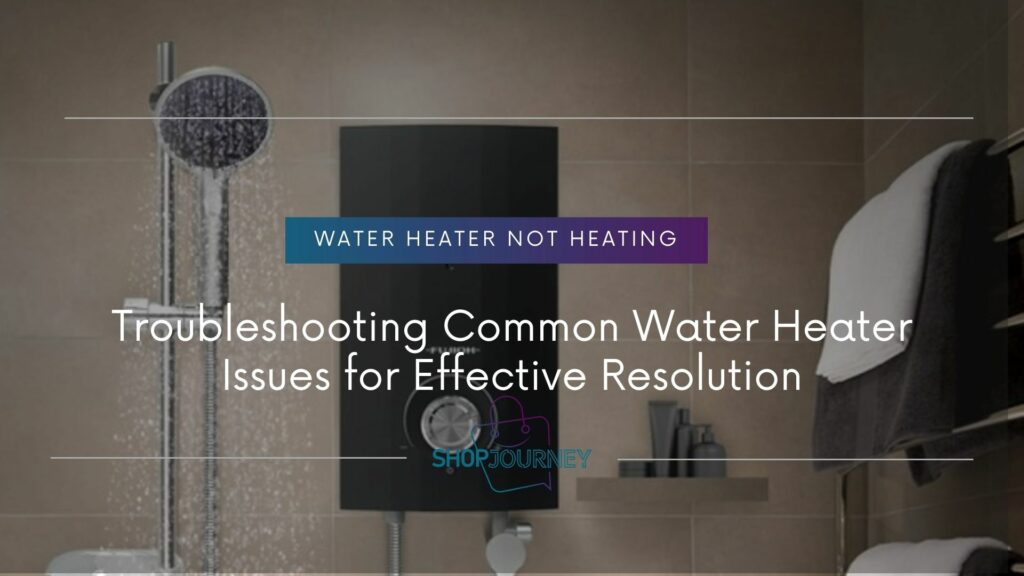Is your water heater not heating? Dealing with a water heater that isn’t heating can be a major inconvenience, impacting daily activities like showering and dishwashing.
Several factors, including thermostat malfunctions, sediment accumulation, and electrical issues, can contribute to this problem. Understanding these common issues is essential for troubleshooting and resolving the issue effectively.
Common Water Heater Problems
Sediment Buildup
Over time, minerals and other sediment can accumulate at the bottom of the tank, causing it to become less efficient and possibly even leading to leaks. To diagnose this problem, look for a rumbling or popping sound coming from the tank. To fix it, flush the tank to remove the sediment buildup. This can be done by turning off the power or gas supply to the water heater, attaching a hose to the drain valve, and opening the valve to allow the sediment to drain out.
Faulty Thermostat
If the water temperature is not consistent or the water is not heating up at all, a faulty thermostat may be to blame. To diagnose this problem, check the temperature setting on the thermostat and make sure it is set correctly. If it is, test the thermostat with a multimeter to see if it is working properly. If it is not, replace the thermostat.
Tripped Circuit Breaker or Blown Fuse
If an electric water heater is not heating up, a tripped circuit breaker or blown fuse may be the culprit. To diagnose this problem, check the circuit breaker or fuse box to see if the breaker has tripped or the fuse has blown. If it has, reset the breaker or replace the fuse. If the breaker or fuse continues to trip or blow, call a professional plumber to diagnose the issue.
Pilot Light or Thermocouple Issues
For gas water heaters, issues with the pilot light or thermocouple can prevent the water heater from heating up. To diagnose this problem, check to see if the pilot light is lit. If it is not, relight it according to the manufacturer’s instructions. If the pilot light continues to go out, the thermocouple may be faulty and need to be replaced. Additionally, gas leaks can be dangerous, so if you smell gas, turn off the gas supply to the water heater and call a professional plumber immediately.
Faulty Heating Element
For electric water heaters, a faulty heating element can prevent the water from heating up. To diagnose this problem, use a multimeter to test the heating element for continuity. If it is not working properly, replace the heating element. Additionally, regular maintenance such as flushing the tank can help prevent sediment buildup and prolong the life of the heating element.
When To Buy A New Water Heater
Assessing Age and Damage
The age of a water heater is a crucial factor in determining when to replace it. Most water heaters last between 10 to 15 years, depending on the quality of the unit and how well it was maintained. If a water heater is approaching the end of its lifespan, it may be time to consider a replacement.
Another factor to consider is the amount of damage to the water heater. Corrosion, rust, and leaks can cause significant damage to the unit, leading to poor performance and eventual failure. If a water heater is leaking or showing signs of significant damage, it may be time to replace it.
Evaluating Water Heater Performance
If a water heater is not working correctly, it may be time to replace it. Common signs of poor performance include lukewarm water, rust-colored water, foul odor, and a water heater not working at all. If a water heater is not providing hot water or is producing discolored or smelly water, it may be time to consider a replacement.
Considering Tankless Options
Tankless water heaters are an excellent option for those looking to replace their current water heater. Unlike traditional water heaters, tankless water heaters provide hot water on demand, which can save energy and money. However, tankless water heaters are not suitable for every household. They have a higher upfront cost than traditional water heaters and may not be able to provide enough hot water for larger households.
Frequently Asked Questions
1. Why isn’t my water heater heating up?
If your water heater is not heating, there are a few common issues that you can troubleshoot before calling in a professional. One of the most common issues is a faulty thermostat. Check the temperature setting on your water heater to ensure that it is set to the appropriate temperature. If the thermostat is not functioning correctly, it may need to be replaced .
Another common issue is sediment buildup in the tank. Sediment can accumulate over time and cause the heating element to fail. To fix this issue, you may need to drain the tank and remove the sediment. This should be done by a licensed plumber or electrician.
2. How can I maintain and care for my water heater?
Regular maintenance and care can help prevent issues with your water heater. One important maintenance task is to replace the anode rod every few years. This rod helps prevent corrosion in the tank and should be replaced before it is completely corroded.
Another important maintenance task is to flush the tank to remove sediment buildup. This should be done at least once a year to ensure that the heating element is functioning correctly.
3. When should I seek professional assistance for water heater issues?
If you have tried troubleshooting common issues and performing regular maintenance tasks, but your water heater is still not heating, it may be time to call a professional. A licensed plumber or electrician can diagnose and fix issues with your water heater.
If you need to relight the pilot light or drain the tank, you can do this yourself. However, if you are not comfortable performing these tasks, it is best to call a professional.
It is important to note that if you are experiencing issues with hot water throughout your home, it may not be an issue with your water heater. It could be an issue with your plumbing or water softener. In this case, it is best to call a professional plumber to diagnose and fix the issue.




